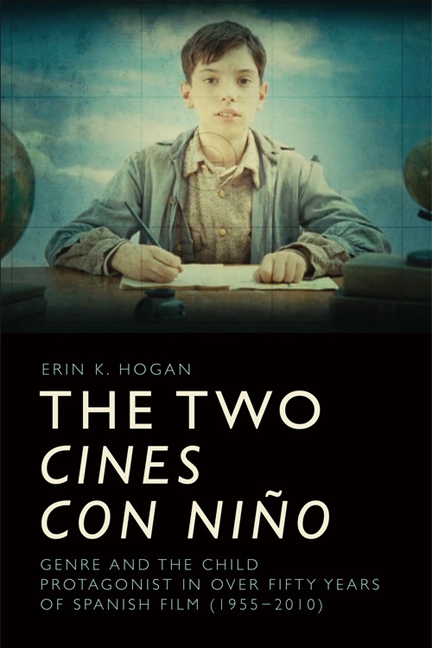Book contents
- Frontmatter
- Contents
- List of Figures
- Acknowledgements
- Figure Permissions
- Introduction The Two Cines Con Niño: The Ventriloquism, Dialogism and Biopolitics of the Children of Franco in Genre Film
- 1 The Black Market and the Stolen Children of Franco in Demonios En El Jardín
- 2 The Appropriative and Carnivalesque Ventriloquism of Altar Boys from Joselito in El pequeño ruiseñor to Ignacio in La mala Educación
- 3 Ventriloquism, Kidnapping and the Carnivalesque in Marisol’s Tómbola
- 4 Adopting, Adapting and Appropriating in the cines con niño: Un rayo de luz and El viaje de Carol
- 5 Prosopopeia and the Gothic Child from Marcelino pan y vino to El Orfanato
- 6 Dialogism and Ritual Function of the Nuevo Cine Con Niño: El Espíritu De La Colmena, Secretos Del Corazón And El Laberinto Del Fauno
- 7 Queering Post-war Childhood in Urte Ilunak and Pa Negre
- 8 The Transatlantic Dialogism in Narrative and Aesthetics of Bildungsfilms: La Lengua De Las Mariposas, Machuca, El Espíritu De La Colmena, El Premio, El Laberinto Del Fauno And Infancia Clandestina
- Conclusion Spanish Movies: Genre, Nation and Spanish Movie
- Select Filmography
- Select Bibliography
- Index
4 - Adopting, Adapting and Appropriating in the cines con niño: Un rayo de luz and El viaje de Carol
Published online by Cambridge University Press: 01 May 2021
- Frontmatter
- Contents
- List of Figures
- Acknowledgements
- Figure Permissions
- Introduction The Two Cines Con Niño: The Ventriloquism, Dialogism and Biopolitics of the Children of Franco in Genre Film
- 1 The Black Market and the Stolen Children of Franco in Demonios En El Jardín
- 2 The Appropriative and Carnivalesque Ventriloquism of Altar Boys from Joselito in El pequeño ruiseñor to Ignacio in La mala Educación
- 3 Ventriloquism, Kidnapping and the Carnivalesque in Marisol’s Tómbola
- 4 Adopting, Adapting and Appropriating in the cines con niño: Un rayo de luz and El viaje de Carol
- 5 Prosopopeia and the Gothic Child from Marcelino pan y vino to El Orfanato
- 6 Dialogism and Ritual Function of the Nuevo Cine Con Niño: El Espíritu De La Colmena, Secretos Del Corazón And El Laberinto Del Fauno
- 7 Queering Post-war Childhood in Urte Ilunak and Pa Negre
- 8 The Transatlantic Dialogism in Narrative and Aesthetics of Bildungsfilms: La Lengua De Las Mariposas, Machuca, El Espíritu De La Colmena, El Premio, El Laberinto Del Fauno And Infancia Clandestina
- Conclusion Spanish Movies: Genre, Nation and Spanish Movie
- Select Filmography
- Select Bibliography
- Index
Summary
Introduction
In the preceding chapters I have theorised the ventriloquial appropriation of the child protagonist's voice and body and the dialogism of the cines con niño. I turn my attention now to a particularly self-aware case of dialogism: adaptation. My focus will be on story, thus the narrative points of contact and departure rather than cinematic language, in two key films across the cines con niño that indicate the greater narrative appropriation of the cine con niño genre. Having explored in Chapter Three how Francoist cinema characterises Marisol as its ventriloquist's dummy in her third film Tómbola (Lucía 1962), we return to Marisol's first film in order to consider dialogism as narratological ventriloquism, or, following Bakhtin, ventriloquation. Subsequent oppositional filmmaking of constitutional Spain utilises the storytelling strategies of Un rayo de luz (A Ray of Light) (Luis Lucía 1960) for its political purposes. I argue that the cine con niño film Un rayo de luz and the nuevo cine con niño feature El viaje de Carol (Carol's Journey) (Imanol Uribe 2002) adapt the same nineteenth-century Anglo-American literary source text, Francis Hodgson Burnett's chil-dren's literature classic from 1885 Little Lord Fauntleroy, for opposing ideals of the two Spains.
The nature of the three texts that I analyse in this chapter calls for an intersectional approach that draws upon literary genre (Mikhail Bakhtin), film genre (Rick Altman), and adaptation theory (Deborah Cartmell, Julie Sanders, and Linda Hutcheon). Following Julie Sanders's terminology, I will examine the dialogism of adaptation and, in particular, the case of analogue and transposition between Marisol (Pepa Flores) and Carol (Clara Lago) in their respective feature-film debuts. These examples from the cine con niño and the nuevo cine con niño offer exceptional insight into the utilisation of the child protagonist in twentieth and twenty-first century Spain for contrary ideologies regarding family, nation, class, and gender.
Un rayo de luz and El viaje de Carol each participate in double-voiced discourse that addresses the national past and present. Lucía's feature, set and released in the 1960s, makes analogous mention of the conflict between the ‘rebels’ and the ‘reds’ in the Spanish Civil War during the 1930s. Uribe's feature is set during the Civil War (1936–9) but also dialogues with the prominent memory debate that led to the passing of the Law of Historical Memory five years later.
- Type
- Chapter
- Information
- The Two cines con niñoGenre and the Child Protagonist in Fifty Years of Spanish Film (1955–2010), pp. 88 - 106Publisher: Edinburgh University PressPrint publication year: 2018



